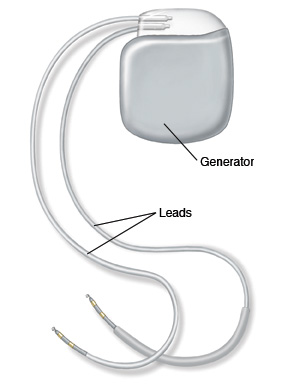Your ICD (implantable cardioverter/defibrillator) delivered a shock today. You should be looked at by a health care provider either in person or remotely within
The shock can be painful. You may feel soreness in your muscles or just “shaken up” emotionally from the unexpected event.
If your ICD is discharging often, the cause can be found by checking the recordings of your heart rhythm just before the discharge occurred. Then your provider can adjust the ICD settings, assess any changes in your heart condition, or change your heart medicines to reduce how often the device discharges.
Home care
The following guidelines will help you care for yourself at home:
-
Tell your health care provider right away if you have an ICD shock. They will advise you if you need to go to the hospital right away.
-
Current ICDs can connect with a remote monitoring system through the internet or a phone line. If you have remote monitoring set up for your ICD, you can do an interrogation and send the data to your provider.
-
Talk with your provider about any limits on your activities. At the least, rest today and resume your usual activities tomorrow.
-
Don't push or pull on the defibrillator. This may cause the wires to become twisted.
-
Don't use cell phones or other electronic devices, such as smartwatches, near the generator. Keep them on the opposite side of your ICD and carry them in a bag below your waist.
-
Because of the unexpected nature of arrhythmias and the ICD discharge, driving can be dangerous. It's often recommended that you have a 3- to 6-month shock-free period before driving again, depending on the reason for the shock. Talk with your provider to see if it's safe for you to drive. Your state may have certain limits on driving. You won't be able to get a commercial driver's license if you have an ICD.
Follow-up care
Follow up with your health care provider as advised.
It's important your provider checks your device and the battery to make sure they are working correctly after the device has fired.
Battery life depends on how much your heart uses the device. The more times you get a shock from the device, the shorter time the battery will last. Ask your provider how often your device should be checked, but generally you should have the battery checked at least every 6 months. When the battery gets low enough, it goes into an energy-saving mode, and the generator will have to be changed. In general, the generator has to be changed every 10 years.
Call 911
Call
-
Multiple shocks
-
Chest pain
-
Trouble breathing
-
Difficulty with speech or vision, weakness of an arm or leg
-
Weakness, dizziness, lightheadedness, or fainting
When to get medical advice
Get medical attention right away if:
-
You have another ICD discharge.
-
Your heart feels like it's fluttering or beating fast, hard, or irregularly (palpitations).
-
You have pain, swelling, redness, drainage, bleeding, or warmth from the implant site.
-
You have a fever of 100.4°F (38°C) or higher, or as advised by your health care provider.
-
Your generator feels loose or like it's wiggling in the pocket under the skin.
Featured in


